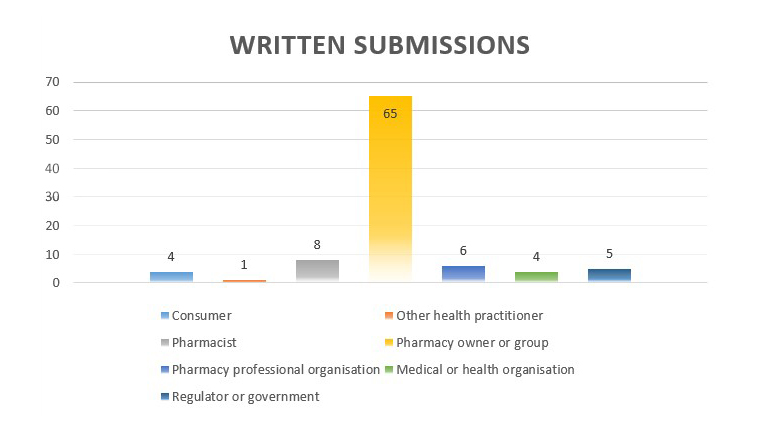News
Superbug warning as states look at expanding pharmacy
Suggestions the Queensland Government exposed the community to a major health risk follow revelations that WA may increase pharmacy scope of practice.
 Pharmacists have called for a greater role in the provision of some services currently limited to medical practitioners.
Pharmacists have called for a greater role in the provision of some services currently limited to medical practitioners.
UPDATED
A recently released Western Australia Health Department review of community pharmacy ownership includes recommendations to significantly increase the number of clinical services offered by pharmacists, while Queensland is moving ahead with a trial allowing pharmacists to prescribe the pill and dispense antibiotics for the treatment of urinary tract infections (UTIs).
RACGP Queensland Chair Dr Bruce Willett holds grave concerns about the dispensing trial and called for it to be put on hold until the completion of Australia’s Antimicrobial Resistance Strategy – 2020 and beyond.
‘As doctors, we are seriously concerned about the growing rate of infections that are antibiotic resistant. Already, one in five UTIs are resistant to the medication this trial is proposing to use,’ Dr Willett said.
‘The science is clear and backed by the United Nations, European Union and the World Health Organization, just to name a few. If we do not reduce the amount of antibiotics used we pose huge risks to our future generations.
‘A UTI is not a straightforward matter that can be diagnosed in a pharmacy setting. Many sexually transmitted infections and more serious conditions like diabetes and cancer can masquerade as a UTI, so this trial poses a significant risk to patients’ health.’
Meanwhile, proposals from the WA Health Department review into ownership trends, legislation, and the role of pharmacy in an integrated model of healthcare have also been criticised by medical groups.
The review attracted a number of submissions, including from the RACGP, but the overwhelming majority of respondents – 65 out of 93 – were pharmacy owners or groups. Many of the submissions considered pharmacy and pharmacist capacity to be ‘underutilised’, and recommended changes to ‘enhance efficiency of the health system’.
‘Changes could include services to provide additional vaccinations, health screening, chronic disease management, health promotion, and other medicines-related activities,’ the report states.
‘Pharmacists could offer a wider range of medication management reviews and related services in collaboration with general practitioners. Scope extension for pharmacists might also include some models of prescribing.
‘The review recommends that progress on these proposed directions should be supported, within certain limits, but only where safe to do so and when they add to the overall quality of primary care.’
A number of submissions cited diabetes and asthma as examples of chronic illnesses that could be screened for or managed by pharmacists, while early-intervention mental health screening and management was also suggested.

An overwhelming number of the submissions to the Western Australia Health Department review of community pharmacy ownership – 65 out of 93 – were made by pharmacy owners or groups.
The report was released less than a week after WA became just the second state to allow pharmacists to administer influenza vaccines to children as young as 10, which also attracted criticism from medical groups.
The RACGP’s submission to the review of community pharmacy ownership criticised the short window of time provided for stakeholder consultation to the review’s interim report, as well as the potential for recommendations in the final report to be presented without proper scrutiny. The college also outlined its belief that there had been an overemphasis on patient access at the expense of safe and high-quality healthcare.
‘The RACGP maintains that pharmacists add value when providing services related to the safe, effective and efficient use of medicines. The increasing push to expand the scope of pharmacy beyond this is inappropriate, puts patients at risk and wastes valuable health resources,’ the submission states.
‘Initiatives such as ordering and interpreting lab tests and health screening ventures into medical diagnosis – a role that pharmacists are not appropriately trained to undertake.
‘The pharmacy profession may argue that the additional medical services they are providing are within the scope of pharmacy. It should be acknowledged that in many respects pharmacists set their own scope of practice through the Pharmaceutical Society of Australia’s Professional Practice Standards and the Pharmacy Board of Australia.’
Australian Medical Association (AMA) WA President Dr Andrew Miller also criticised the review, describing it as a ‘wish list for pharmacists who want to be doctors’.
‘If they want to diagnose and treat illness properly then pharmacists should go to medical school,’ Dr Miller said.
‘We do not go down to a shop to find out what the symptoms in our body might be causing. That is not appropriate.
‘Pharmacists are not doctors, and to try to short-change patients by suggesting they can be is not going to be good for anybody’s health.’
However, despite the RACGP’s misgivings and concern, WA Health Minister Roger Cook said his department would consider the recommendations.
‘The role of the pharmacist is changing and we need to ensure we regulate and support the industry appropriately,’ he said.
‘Our recent announcement to allow pharmacists to provide flu vaccines to children aged 10 years and above underpins our view of the important role pharmacies play in the provision of community healthcare.’
Pharmacy Guild of Western Australia director Matthew Tweedie also rejected the criticism and said the AMA’s position is ‘ill-informed’.
‘No one is planning to be the doctor,’ Mr Tweedie said.
‘It’s about taking steps to utilise the workforce you’ve got. It’s trained, it’s ready, it can do things. We need to ensure that it can.
‘There is a role here for general practice and pharmacy to work together. We’re happy to work with whoever to make that a reality for West Australians.’
Pharmacy Scope of practice Western Australia
newsGP weekly poll
Would it affect your prescribing if proven obesity management medications were added to the PBS?